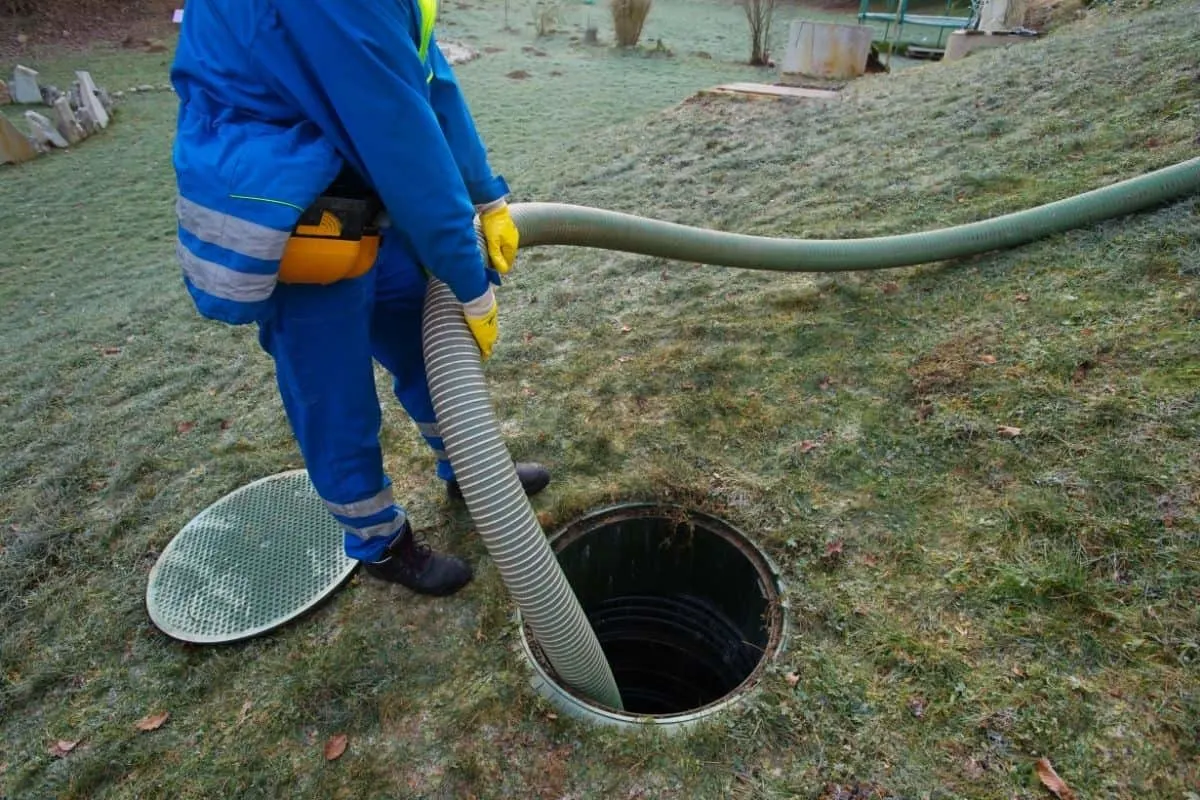If you own a home with a septic tank then you’ve probably wondered to yourself whether or not septic tank additives are necessary. To use or not to use them – that is the question!
According to recent studies by neutral parties, the use of additives with septic tanks for an occupied home with a properly sized tank is unnecessary. Pumping the tank every 3-5 years is the best way to ensure that it functions properly and lasts.
Knowing that this may go against what you’ve heard for years, make sure to keep reading to learn more about why these additives are an unnecessary cost!
Should I use additives in my septic tank?
For many years, we have devotedly added enzymatic additives to abet the tank’s digestion of human waste. Whenever our lines are unclogged and our tanks are pumped out, we always watch the septic tank professionals pour in some additives, saying that they will help keep our septic system healthy.
However, more recent information seems to suggest otherwise…
The answer to whether you should or shouldn’t use additives in your septic tank depends on how frequently you use your septic tank.
If you are a full-time homeowner or a residential property owner, adding additives to your septic tank is not necessary.
The reason why it is unnecessary to use additives is that your septic tank has anaerobic bacteria that are added naturally to the tank from the waste that goes down the drain.
The existing bacteria are enough to keep the septic system work efficiently.
This is supported by studies from both the University of Kentucky College of Agriculture as well as the EPA. If they don’t count as unbiased parties, then I’m not sure who does!
If you are a part-time homeowner, however, you may use additives in your septic tank. Part-time homeowners, fondly referred to as “snowbirds,” are people who get to live in their rural or vacation homes for a short duration of time. Their septic tanks stay underutilized for the many months they are gone.
The intermittent use of septic systems denies the tanks the helpful bacteria it normally would receive from daily wastewater. The lack of the helpful bacteria causes solids to build-up more rapidly in the septic tank.
If you are a part-time homeowner, therefore, you should use additives in your septic tank to prevent the accumulation of solids.
Pros to septic tank additives
We all want that magic bullet – a low-cost solution that saves us energy, precious time, and valuable money.
Like other pipe-clearing “insta-products” available on the market, septic tank manufacturers allege to produce products that can help our septic systems become more efficient at their work.
The following are the hyped benefits of septic tank additives.
#1 Hasten bio-solid digestion
Septic tank additives fall into two categories: biological and chemical. Biological additives are made from enzymes, yeast, and/or bacteria. They are said to work as starter agents in newly installed septic tanks to boost the efficiency of disintegrating solid waste.
Chemical additives, on the other hand, are solutions that contain chemicals, acids, or alkalis. Household drain cleaners and de-greases fall under this category.
Like biological additives, chemical additives are formulated to breakdown and dissolve scum layer.
#2 Unclog pipes
While sludge naturally sinks to the bottom of the septic tank, the continuous flow of waste water in a full tank can propel sludge upward and toward the outlet.
When this happens, it does not take long before the solid waste clogs the pipes and backs up the entire septic system!
Your septic tank may also have a bacterial deficiency, which may slow down the breakdown of solids, causing clogs in pipes. When you have clogged pipes, you can rely on the corrosive power of septic tank additives to break down and dissolve the clog-causing solids.
#3 Eliminate odors
Every septic system owner has occasionally encountered septic tank odors. The anaerobic bacteria present in your septic tank breaks down waste and the byproduct is toxin methane, carbon dioxide, and hydrogen sulfide gases.
While anaerobic bacteria can break down most solids, it cannot digest things such as paints, solvents, fats, oils, grease, and feminine hygiene products, etc. The build-up of such solids can cause clogging in pipes, which can cause strong septic tank odors.
Use of a septic tank additive that contains high counts of enzymes and bacteria can help to quicken the digestion of solid waste. By restocking the bacteria in your septic tank, you will not only manage to unclog your pipes, but you will also get rid of foul smells.
It’s worth pointing out that a well-maintained septic tank should NOT smell. For more information on this, make sure to take a look at my article here.
Cons to septic tank additives
Although there are several benefits to look forward to when using septic tank additives, there are several disadvantages that you cannot afford to overlook.
Many studies point out that the use of septic additives could cause more harm than good. The following are the demerits of using septic tank additives.
#1 Structural damage
Some chemical additives contain sulfuric acid, which is highly corrosive in concentrated form.
While the corrosive power of such additives helps to break down solids and unclog pipes, it also causes damage to your pipes and septic tank.
Therefore, excessive use of septic tank additives may cause structural damage that may be costly to repair.
#2 Groundwater contamination
Although they are meant to speedy the digestion process, septic tank additives can disrupt the separation process that occurs inside the tank.
The disruption may end up contaminating the groundwater.
#3 Soil agitation
Some chemical additives contain alum, baking soda, formaldehyde, and hydrogen peroxide.
When added to the septic tank, these chemicals could agitate the soils containing silts and clays, damaging the soil structure and changing its permeability characteristics.
#4 Unnecessary cost
Since the septic tank has naturally-occurring bacteria that help to keep it running smoothly, septic tank additives are an unnecessary investment.
Considering that many scientific studies cite that the use of septic tank additives is not necessary, you may end up wasting your hard-earned cash unnecessarily.
Does adding bacteria to septic tanks work?
For new septic systems, many homeowners believe that they must add bacteria for their septic tanks to work.
Although septic systems need bacteria to work, most experts agree that it is not necessary to add bacteria, chemicals, or enzymes to your septic tank to make it work.
While you may not need to add bacteria to your septic tank under normal circumstances, you may need to do so under certain conditions.
For instance, adding bacteria can be useful if your septic tank is consistently overloaded with usage. In such a scenario, additional bacteria can help your septic tank to achieve more balance and stability.
What should you NOT put in your septic system?
What you put in your septic tank greatly impacts its capability to do its job. Your septic tank is by no means a garbage pit, so the rule of thumb is to avoid putting anything that is meant for the trash bin.
Knowing what should and what should not be put in a septic tank will help you save lots of money and headaches in the long run.
It will also help to extend the life of your septic tank, protect your property, and safeguard the health of your family and the environment.
Avoid putting the following items in your septic system:
- Anything non-biodegradable, such as paper towels, plastic, sanitary tampons, condoms, disposable diapers, cigarette butts, etc.
- Insoluble chemicals, such as paints, oils, solvents, gasoline, and photographic chemicals, etc.
- Hazardous wastes, including insect killers, weed killers, and poisons, etc.
- Grease and fats as they can solidify and clog your pipes.
- Kitchen waste, such as coffee grinds, food scraps, and other food items.
- Pharmaceuticals, including prescribed and over-the-counter medications.
There are various reasons why you should not put the above things in your septic tank, depending on what the items are.
For instance, the non-biodegradable items may clog your pipes and cause major problems for you and your neighbors. As for the hazardous wastes, they can contaminate the soil, the groundwater, and harm the environment!
For the plumbing in your home to work efficiently, septic tank maintenance is must. If you are having issues with your septic tank, it is best to talk to a professional first.
A licensed professional will come in and do the cleaning, maintenance, or repairs to your septic system.
Conclusion on Septic Tank Additives
While there are a lot of areas that you can spend money as a homeowner, septic tank additives probably aren’t your best choice.
For second homes or those that get little use, they may have some value. However, for a primary home with a properly sized septic tank their doesn’t seem to be enough proof to suggest that they do.
If you determine that your septic tank is too small for your home, then you may want to consider having the tank system expanded to address the issue. The next question that naturally comes up then is where to place it!
For more information on this topic, make sure to take a look at my article on how far a septic tank needs to be from your house.


